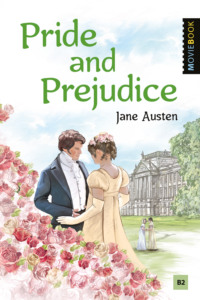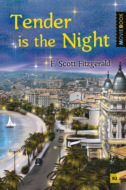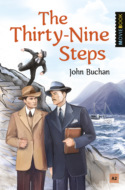Kitabı oku: «Pride and Prejudice / Гордость и предубеждение», sayfa 2
Chapter 6
The ladies of Longbourn soon visited those of Netherfield. Miss Bennet's pleasing manners were liked by Mrs. Hurst and Miss Bingley; and though the mother was found to be intolerable, and the younger sisters not worth speaking to, a wish of being better acquainted with them was expressed towards the two eldest. By Jane, this attention was received with the greatest pleasure, but Elizabeth still saw arrogance in their treatment of everybody, and could not like them; though their kindness to Jane arose in all probability from the influence of their brother's admiration. It was generally evident whenever they met, that he did admire her and to her it was equally evident that Jane would soon be very much in love. But she considered with pleasure that it was not likely to be discovered by everyone, since Jane combined, with great strength of feeling, a composure of temper and a cheerfulness of manner which would guard her from the suspicions of the impudent. She mentioned this to her friend Miss Lucas.
“It may perhaps be pleasant,” replied Charlotte, “to be able to deceive the public in such a case; but it is sometimes a disadvantage to be so very guarded. If a woman conceals her affection with the same skill from the object of it, she may lose the opportunity of fixing him. In nine cases out of ten a woman had better show more affection than she feels. Bingley likes your sister undoubtedly; but he may never do more than like her, if she does not help him on.”
“But she does help him on, as much as her nature allows. If I can perceive her regard for him,23 he must be a simpleton, indeed, not to discover it too.”
“Remember, Eliza, that he does not know Jane's disposition as you do. Though Bingley and Jane meet tolerably often, it is never for many hours together; and, as they always see each other in large mixed parties, it is impossible that every moment should be employed in conversing together. Jane should therefore make the most of24 every half-hour in which she can command his attention. When she is secure of him,25 there will be more leisure for falling in love as much as she chooses.”
“Your plan is a good one,” replied Elizabeth, “where nothing is in question but the desire of being well married, and if I were determined to get a rich husband, or any husband, I would adopt it. But these are not Jane's feelings; she is not acting by design. As yet,26 she cannot even be certain of the degree of her own regard nor of its reasonableness. She has known him only a fortnight. She danced four dances with him at Meryton; she saw him one morning at his own house, and has since dined with him in company four times. This is not quite enough to make her understand his character.”
“Not as you represent it. Had she merely dined with him, she might only have discovered whether he had a good appetite; but you must remember that four evenings have also been spent together – and four evenings may do a lot. I believe happiness in marriage is entirely a matter of chance; and it is better to know as little as possible of the defects of the person with whom you are to pass your life.”
“You make me laugh, Charlotte; but it is not sound. You know it is not sound, and that you would never act in this way yourself.”
Occupied in observing Mr. Bingley's attentions to her sister, Elizabeth was far from suspecting that she was herself becoming an object of some interest in the eyes of his friend. At first, Mr. Darcy had looked at her without admiration. But soon he began to find that her face was uncommonly intelligent through the beautiful expression of her dark eyes. He was also forced to acknowledge her figure to be light and pleasing. Of this she was perfectly unaware; to her he was only the man who made himself agreeable nowhere, and who had not thought her handsome enough to dance with.
He began to wish to know more of her, and as a step towards conversing with her himself, attended to her conversation with others. His doing so drew her notice. It was at Sir William Lucas's, where a large party were assembled.
“What does Mr. Darcy mean,” said she to Charlotte, “by listening to my conversation with Colonel Forster?”
“That is a question which Mr. Darcy only can answer.”
“But if he does it any more I will certainly let him know that I see what he is about. He has a very satirical eye,27 and if I do not begin by being impudent myself, I will soon grow afraid of him.”
On his approaching them soon afterwards, though without seeming to have any intention of speaking, Elizabeth turned to him and said:
“Did you not think, Mr. Darcy, that I expressed myself uncommonly well just now, when I was teasing Colonel Forster to give us a ball at Meryton?”
“With great energy; but it is always a subject which makes a lady energetic.”
“You are severe on us.”
“It will be her turn soon to be teased,” said Miss Lucas. “I am going to open the instrument, Eliza, and you know what follows.”
Before she could reply, her sister Mary, who was always impatient for display, started playing on the pianoforte28.
Mary had neither genius nor taste; but she had a pedantic air and conceited manner, which would have been good for a higher degree of excellence than she had reached. At the end of a long concerto, Mary was glad to purchase praise by Scotch and Irish airs29, at the request of her younger sisters, who, with some of the Lucases, and two or three officers, joined eagerly in dancing at one end of the room.
Mr. Darcy stood near them in silent indignation at such a way of passing the evening, and was too much engrossed by his thoughts to perceive that Sir William Lucas was his neighbour, till Sir William thus began:
“What a charming amusement for young people this is, Mr. Darcy! There is nothing like dancing after all. I consider it as one of the first refinements of polished society.”30
“Certainly, sir; and it is also in vogue amongst the less polished societies of the world. Every savage can dance.”
Sir William only smiled. “Your friend performs delightfully,” he continued after a pause, seeing Bingley join the group; “and I doubt not that you are an adept31 in the science yourself, Mr. Darcy.”
“You saw me dance at Meryton, I believe, sir.”
“Yes, indeed, and received no inconsiderable pleasure from the sight.”
At that instant Elizabeth was moving towards them, and Sir William called out to her:
“My dear Miss Eliza, why are you not dancing? Mr. Darcy, you must allow me to present this young lady to you as a very desirable partner. You cannot refuse to dance, I am sure when so much beauty is before you.” And, taking her hand, he was going to give it to Mr. Darcy who, though extremely surprised, was not unwilling to receive it, when she instantly drew back, and said with some discontent to Sir William:
“Indeed, sir, I have not the least intention of dancing. I entreat you not to suppose that I moved this way in order to beg for a partner.”
Mr. Darcy, with grave propriety,32 requested to be allowed the honour of her hand, but in vain. Elizabeth was determined.
She looked playfully, and turned away. Her resistance had not injured her with the gentleman,33 and he was thinking of her with some contentment, when thus approached by Miss Bingley:
“I can guess the subject of your thought.”
“I do not think you can.”
“You are considering how insupportable it would be to pass many evenings in this manner – in such society; and indeed I am quite of your opinion. I was never more annoyed! The boredom, and yet the noise – the nothingness, and yet the self-importance of all those people! What would I give to hear your criticisms of them!”
“Your supposition is totally wrong, I assure you. My mind was more agreeably engaged. I have been meditating on the very great pleasure which a pair of fine eyes in the face of a pretty woman can give.”
Miss Bingley immediately fixed her eyes on his face, and desired he would tell her what lady had the credit of inspiring such reflections. Mr. Darcy replied:
“Miss Elizabeth Bennet.”
“Miss Elizabeth Bennet!” repeated Miss Bingley. “I am all astonishment. How long has she been such a favourite? – and when am I to wish you joy?”
“That is exactly the question which I expected you to ask. A lady's imagination is very rapid; it jumps from admiration to love, from love to matrimony, in a moment. I knew you would be wishing me joy.”
“Well, if you are serious about it, I will consider the matter absolutely settled. You will be having a charming mother-in-law, indeed; and, of course, she will always be at Pemberley with you.”
He listened to her with perfect indifference while she chose to entertain herself in this manner; and as his composure convinced her that all was safe, her wit flowed long34.
Chapter 7
Mr. Bennet's property consisted almost entirely in an estate of two thousand a year, which, unfortunately for his daughters, was inherited, in default of heirs male,35 by a distant relation; and their mother's fortune could not supply the deficiency of his. Her father had been an attorney in Meryton, and had left her four thousand pounds.
She had a sister married to a Mr. Phillips, who had been a clerk to their father and succeeded him in the business, and a brother, who was in trade and settled in London.
The village of Longbourn was only one mile from Meryton; a most convenient distance for the young ladies, who usually went there three or four times a week, to pay a visit to their aunt and to a milliner's shop36 just over the way. The two youngest of the family, Catherine and Lydia, were particularly frequent visitors. Their minds were more vacant than their sisters', and when nothing better offered, a walk to Meryton was necessary to amuse their morning hours and provide conversation for the evening. They always learnt some news from their aunt. At present, indeed, they were well supplied both with news and happiness by the recent arrival of a militia regiment37 in the neighbourhood. It was going to remain the whole winter, and Meryton was the headquarters.
Their visits to Mrs. Phillips now added something to their knowledge of the officers' names and connections. Their lodgings were not long a secret, and soon they began to know the officers themselves. Mr. Phillips visited them all, and this opened to his nieces joy unknown before. They could talk of nothing but officers.
After listening one morning to their talk on this subject, Mr. Bennet coolly observed:
“From all that I can collect by your manner of talking, you must be two of the silliest girls in the country. I have suspected it some time, but I am now convinced.”
Catherine made no answer; but Lydia, with perfect indifference, continued to express her admiration of Captain Carter, and her hope of seeing him in the course of the day, as he was going the next morning to London.
“I am astonished, my dear,” said Mrs. Bennet, “that you are so ready to think your own children silly. All of them are very clever.”
“This is the only point, I flatter myself,38 on which we do not agree. I had hoped that our sentiments coincided in every particular, but I must so far differ from you as to think our two youngest daughters uncommonly foolish.”
“My dear Mr. Bennet, you must not expect such girls to have the sense of their father and mother. When they get to our age, they will not think about officers any more than we do. I remember the time when I liked a red coat myself very well – and, indeed, so I do still at my heart. If a smart young colonel, with five or six thousand a year, wants one of my girls I will not say no to him; and I thought Colonel Forster looked very charming the other night at Sir William's in his regimentals.”
Mrs. Bennet was interrupted by the entrance of the footman with a note for Miss Bennet; it came from Netherfield, and the servant waited for an answer. Mrs. Bennet's eyes sparkled with pleasure, and she was eagerly calling out, while her daughter read,
“Well, Jane, who is it from? What is it about? What does he say? Well, Jane, make haste and tell us; make haste, my love.”
“It is from Miss Bingley,” said Jane, and then read it aloud.
“MY DEAR FRIEND, —
“If you do not dine to-day with Louisa and me, we will be in danger of hating each other for the rest of our lives, for a whole day's tête-à-tête between two women can never end without a quarrel. Come as soon as you can on receipt of this. My brother and the gentlemen are going to dine with the officers. – Yours ever,
“CAROLINE BINGLEY”
“With the officers!” cried Lydia. “I wonder my aunt did not tell us of that.”
“Dining out,” said Mrs. Bennet, “that is very unlucky.”
“Can I have the carriage?” said Jane.
“No, my dear, you had better go on horseback, because it seems likely to rain; and then you must stay all night.”
“That would be a good scheme,” said Elizabeth.
“I would prefer to go in the coach,” said Jane.
“But, my dear, the horses are wanted in the farm. Mr. Bennet, are they not?”
“They are wanted in the farm much oftener than I can get them.”
“But if you have got them to-day,” said Elizabeth, “my mother will be satisfied.”
So Mr. Bennet said that the horses were engaged. Jane was therefore obliged to go on horseback. Jane had not been gone long before it rained hard. Her sisters were uneasy for her, but her mother was delighted. The rain continued the whole evening without intermission; Jane certainly could not come back.
“This was a lucky idea of mine, indeed!” said Mrs. Bennet more than once. The next morning, however, a servant from Netherfield brought the following note for Elizabeth:
“MY DEAREST LIZZY, —
“I find myself very unwell this morning, which, I suppose, is caused by my getting wet through yesterday. My kind friends will not hear of my returning till I am better. They insist also on my seeing Mr. Jones – therefore do not be alarmed if you hear of his visiting me – and, excepting a sore throat and headache, there is not much the matter with me. – Yours, etc.”
Elizabeth, feeling really anxious, was determined to go to her, and as she was no horsewoman, walking was her only alternative. She declared her resolution.
“How can you be so silly,” cried her mother, “as to think of such a thing, in all this dirt! You will not be fit to be seen when you get there.”
“I will be very fit to see Jane – which is all I want.”
“Is this a hint to me, Lizzy,” said her father, “to send for the horses?”
“No, indeed, I do not wish to avoid the walk. The distance is nothing when one has a motive; only three miles. I will be back by dinner.”
“We will go as far as Meryton with you,” said Catherine and Lydia. Elizabeth accepted their company, and the three young ladies set off together.
“If we make haste,” said Lydia, as they walked along, “perhaps we may see something of Captain Carter before he goes.”
In Meryton they parted; the two youngest went to the lodgings of one of the officers' wives, and Elizabeth continued her walk alone, crossing field after field at a quick pace, and finding herself at last within view of the house, with dirty stockings and a face glowing with the warmth of exercise.
She was shown into the breakfast-parlour, where all but Jane were assembled, and where her appearance created a great deal of surprise. That she had walked three miles so early in the day, in such dirty weather, and by herself, was almost incredible to Mrs. Hurst and Miss Bingley; and Elizabeth was convinced that they held her in contempt39 for it. She was received, however, very politely by them; and in their brother's manners there was something better than politeness; there was good humour and kindness. Mr. Darcy said very little, and Mr. Hurst nothing at all. The former was divided between admiration of the brilliancy which exercise had given to her complexion, and doubt as to the occasion's justifying her coming so far alone. The latter was thinking only of his breakfast.
Elizabeth was glad to be taken to Jane immediately; and Jane was delighted at her entrance. She was not able, however, to talk much, and when Miss Bingley left them together, could attempt little besides expressions of gratitude for the extraordinary kindness she was treated with. Elizabeth silently attended her.
When breakfast was over they were joined by the sisters; and Elizabeth began to like them herself, when she saw how much affection they showed for Jane. The apothecary40 came, and having examined his patient, said that she had caught a violent cold; advised her to return to bed, and promised her some draughts41. The advice was followed readily, for the feverish symptoms increased, and her head ached acutely. Elizabeth did not quit her room for a moment; nor were the other ladies often absent.
When the clock struck three, Elizabeth felt that she must go, and very unwillingly said so. Miss Bingley offered her the carriage, but Jane showed such concern in parting with her sister, that Miss Bingley was obliged to convert the offer of the chaise to an invitation to remain at Netherfield for the present. Elizabeth most thankfully consented, and a servant was sent to Longbourn to inform the family about her stay and bring back a supply of clothes.
Chapter 8
At five o'clock the two ladies retired to dress, and at half-past six Elizabeth was summoned to dinner. To the polite inquiries, she could not make a very favourable answer. Jane was by no means42 better. The sisters, on hearing this, repeated three or four times how much they were grieved, how shocking it was to have a bad cold, and how excessively they disliked being ill themselves; and then thought no more of the matter: and their indifference towards Jane restored Elizabeth to her former dislike.
Their brother, indeed, was the only one of the party whom she could regard with any complacency. His anxiety for Jane was evident, and his attentions to herself most pleasing. She had very little notice from any but him.
When dinner was over, she returned directly to Jane, and Miss Bingley began abusing her as soon as she was out of the room. Her manners were pronounced to be very bad indeed, a mixture of pride and impudence; she had no conversation, no style, no beauty. Mrs. Hurst thought the same, and added:
“She has nothing, in short, to recommend her, but being an excellent walker. I will never forget her appearance this morning. She really looked almost wild.”
“She did, indeed, Louisa. Very nonsensical to come at all! Why must she be running about the country, because her sister had a cold? Her hair, so untidy!”
“Yes, and her petticoat; I hope you saw her petticoat, six inches deep in mud, I am absolutely certain.”
“Your picture may be very exact, Louisa,” said Bingley; “but I thought Miss Elizabeth Bennet looked remarkably well when she came into the room this morning. Her dirty petticoat quite escaped my notice.”
“You observed it, Mr. Darcy, I am sure,” said Miss Bingley; “and I am inclined to think that you would not wish to see your sister make such an exhibition.”
“Certainly not.”
“To walk three miles, or four miles, or five miles, or whatever it is, above her ankles in dirt, and alone, quite alone! What could she mean by it? It seems to me to show an offensive sort of arrogant independence, a most country-town indifference to decorum.”
“It shows an affection for her sister that is very pleasing,” said Bingley.
“I am afraid, Mr. Darcy,” observed Miss Bingley in a half whisper, “that this adventure has rather affected your admiration of her fine eyes.”
“Not at all,” he replied; “they were brightened by the exercise.” A short pause followed this speech, and Mrs. Hurst began again:
“I have an excessive regard for Miss Jane Bennet, she is really a very sweet girl, and I wish with all my heart she were well settled. But with such a father and mother, and such low connections, I am afraid there is no chance of it.”
To this Bingley made no answer.
Soon, however, the sisters returned to Jane's room, and sat with her till summoned to coffee. She was still very poorly, and Elizabeth did not quit her at all, till late in the evening, when she saw her sleep, and when it seemed to her rather right than pleasant that she should go downstairs herself. On entering the drawing-room she found the whole party at loo43, and was immediately invited to join them; but suspecting them to be playing high44 she declined it, and making her sister the excuse,45 said she would amuse herself for the short time she could stay below, with a book. Mr. Hurst looked at her with astonishment.
“Do you prefer reading to cards?” said he; “that is rather singular.”
“Miss Eliza Bennet,” said Miss Bingley, “despises cards. She is a great reader, and has no pleasure in anything else.”
“I deserve neither such praise nor such censure,” cried Elizabeth; “I am not a great reader, and I have pleasure in many things.”
“In nursing your sister I am sure you have pleasure,” said Bingley; “and I hope it will be soon increased by seeing her quite well.”
Elizabeth thanked him from her heart, and then walked towards the table where a few books were lying. He immediately offered to fetch her others – all that his library afforded.
Elizabeth assured him that she could suit herself perfectly with those in the room.
“I am astonished,” said Miss Bingley, “that my father has left such a small collection of books. What a delightful library you have at Pemberley, Mr. Darcy!”
“It ought to be good,” he replied, “it has been the work of many generations.”
“And then you have added so much to it yourself, you are always buying books.”
“I cannot comprehend the neglect of a family library in such days as these.”
“Neglect! I am sure you neglect nothing that can add to the beauties of that noble place. Charles, when you build your house, I wish it may be half as delightful as Pemberley.”
“I wish it may.”
“But I would really advise you to make your purchase in that neighbourhood, and take Pemberley for a kind of model. There is not a finer county in England than Derbyshire.”
Elizabeth was so much caught with what passed, that she laid her book aside, drew near the card-table, and stood between Mr. Bingley and his eldest sister, to observe the game.
“Is Miss Darcy much grown since the spring?” said Miss Bingley; “will she be as tall as I am?”
“I think she will. She is now about Miss Elizabeth Bennet's height, or rather taller.”
“How I long to see her again! I never met with anybody who delighted me so much. Such manners! And so extremely accomplished for her age! Her performance on the pianoforte is exquisite.”
“It is amazing to me,” said Bingley, “how young ladies can have patience to be so very accomplished as they all are.”
“All young ladies accomplished! My dear Charles, what do you mean?”
“Yes, all of them, I think. They all paint and net purses46.”
“Your list of the common extent of accomplishments,” said Darcy, “has too much truth. The word is applied to many a woman who deserves it no otherwise than by netting a purse. But I am very far from agreeing with you in your estimation of ladies in general. I cannot boast of knowing more than half-a-dozen, in the whole range of my acquaintance, that are really accomplished.”
“Nor I, I am sure,” said Miss Bingley.
“Then,” observed Elizabeth, “you must comprehend a great deal in your idea of an accomplished woman.”
“Yes, I do comprehend a great deal in it.”
“Oh! certainly,” cried his faithful assistant. “A woman must have a thorough knowledge of music, singing, drawing, dancing, and the modern languages, to deserve the word; and besides all this, she must possess a certain something47 in her air and manner of walking, the tone of her voice and her expressions.”
“All this she must possess,” added Darcy, “and to all this she must yet add something more substantial, in the improvement of her mind by extensive reading.”
“I am no longer surprised at your knowing only six accomplished women. I rather wonder now at your knowing any.”
“Are you so severe upon your own sex as to doubt the possibility of all this?”
“I never saw such a woman. I never saw such capacity, and taste, and application, and elegance, as you describe, united.”
Mrs. Hurst and Miss Bingley both cried out against the injustice of her implied doubt, and were both protesting that they knew many women who answered this description, when Mr. Hurst called them to order, with bitter complaints of their inattention to the game. As all conversation was thereby at an end, Elizabeth soon afterwards left the room.
“Elizabeth Bennet,” said Miss Bingley, when the door was closed on her, “is one of those young ladies who seek to recommend themselves to the other sex by undervaluing their own; and with many men, I dare say, it succeeds. But, in my opinion, it is a very mean art.”
“Undoubtedly,” replied Darcy, to whom this remark was chiefly addressed, “there is a meanness in all the arts which ladies sometimes use for captivation. Whatever bears affinity to cunning is despicable.”48
Miss Bingley was not so entirely satisfied with this reply as to continue the subject49.
Elizabeth joined them again only to say that her sister was worse, and that she could not leave her. Bingley insisted that Mr. Jones should be sent for immediately; while his sisters, convinced that no country advice could be of any service, recommended an express to town for one of the most eminent physicians. Then it was settled that Mr. Jones should be sent for early in the morning, if Miss Bennet were not decidedly better. Bingley was quite uncomfortable; his sisters declared that they were miserable. They solaced their misery, however, by duets after supper, while he could find no better relief to his feelings than by giving his housekeeper directions that every attention might be paid to the sick lady and her sister.








